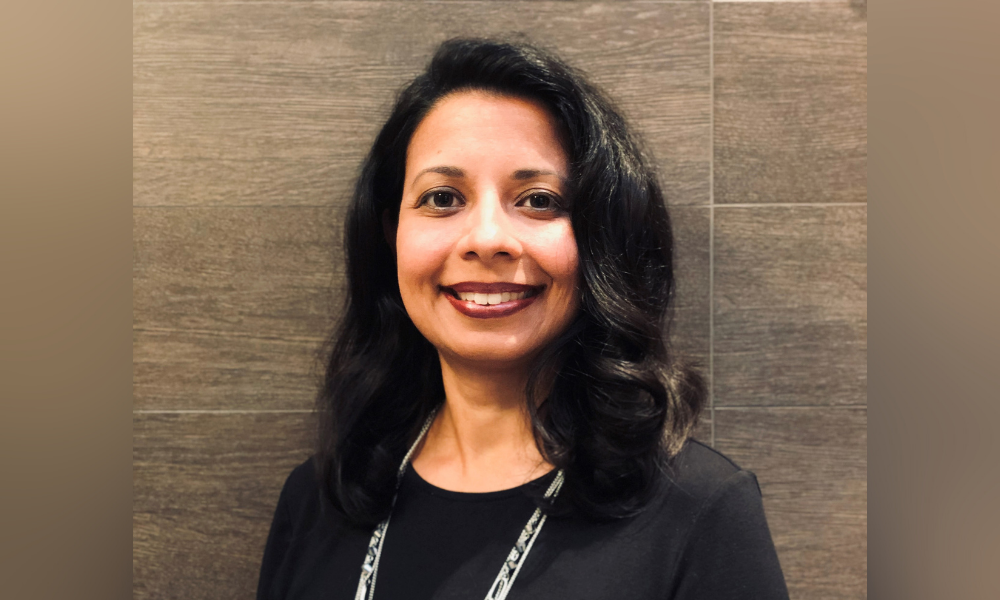
Kanani says it is important that people write and control their own path

Corporate lawyer and Miller Thomson partner Karima Kanani believes people need to integrate their work and personal life to best suit them and does not buy into the phrase “work-life balance.”
“I don’t have a start time or a finished time,” Kanani says. “I have my family that I need to attend to, and I still have the work that I need to attend to, and it is very fluid.”
Everything gets done, but she says her life is integrated. For example, “I may stop to receive my kids from school mid-afternoon, but I’m back on my computer late in the evening to get my work done.”
She says that people should be open in approaching their career and work to find balance, which does not necessarily mean that one stops and the next starts.
Kanani credits Miller Thomson and its ability to accommodate individual needs with an open mind to doing things differently. She has been at the firm for almost 20 years and leads corporare commercial arm of the health industry practice in the Toronto office, working extensively with organizations across the entire continuum of care, from large public hospitals to smaller community service agencies.
“We provide full-service support to these organizations, including support with board governance and strategy to construction and procurement, contracting services, regulatory, privacy, litigation, and advocacy support.”
Kanani interviewed with Miller Thomson as a summer student and the firm gave her the autonomy to shape her career how she wanted. Kanani says many U.S firms were also recruiting at the time, and she approached Miller Thomson about splitting her summer between Canada and the U.S.
“At the time, the firm had not done this before, and they said, ‘we’ve never had anybody do this,’ and I said, well, would you be willing to try?”
The firm made a special arrangement, and Kanani spent half her summer at each place. She practised in the U.S for a short time after graduation, but she says her long-term career goals were ultimately in Canada, so she continued her relationship with Miller Thomson and eventually returned.
When Kanani had her first child, she made another unconventional request to arrange an alternate work arrangement during her maternity leave instead of being absent for an entire year, and the firm approved. Likewise, other women have made different alternative work arrangements during their maternity leaves after her request.
“That support has been essential to the longevity of my career at Miller Thomson and the reason that I stayed with the firm.”
Kanani says it is important that people write and control their journey.
“If you don’t speak up and ask, you won’t receive it. You may get a no, you may have to compromise, you may have to take different routes, but if you don’t take the first step, you’re always going to be where you are.”
The legal profession is broad, and while Kanani always thought of going to law school, she says it was not until working at the firm that she had the opportunity to use her legal skills within the health and social service sector.
“I have a bachelor’s in psychology and a master’s in social work, and I didn’t even know that people practise law in that area.”
There are many ways lawyers can use their legal education, and Kanani says she was lucky to be exposed to areas that were a perfect fit for her. Early in her career, a partner and mentor suggested that her personality, skills, and approach would suit practising corporate law.
With no business background, training, or corporate law experience, Kanani was hesitant to become a corporate commercial lawyer, but she received strong encouragement. She says she would not have walked that road had someone not pushed her in that direction.
“They were like, ‘you don’t need the background; you can learn it as you go,’ and that mentoring moment was pivotal to my career because I opened myself up to trying things that I would not have otherwise tried, and it was a great fit. I thoroughly enjoy what I’m doing.”
The ability to contribute to shaping the infrastructure and approach to healthcare delivery has been one of the most fulfilling aspects of the practice, says Kanani.
The health industry touches every family, and Kanani says she is privileged to practise with purpose. “Every mother, husband, child, grandparent, and everyone is somehow exposed to and engaged with health and social services in the life.”
“I’ve had the distinct privilege over many years of being able to support the health and social service system through transformational changes that have occurred over time.”
Young professionals should expose themselves to as many different mentors and individuals as they can throughout their careers because they learn something different from everyone, Kanani says. “Those you meet who will sponsor you along your journey will be critical to your ability to advance.”
Career success is often where an individual has had strong mentorship but, more importantly, sponsorship, which she says are people who “believe in you enough that they are willing to speak for you, push you forward and sometimes past your limits of what you think you can do.”
“I have benefited from sponsors who have stood by me and believed in my abilities, and when you have people who believe in your abilities that strongly, it helps you to believe in yourself.”
Perseverance, commitment, and hard work are the fundamental steppingstones no matter what people choose to do to advance themselves, Kanani says. She continually educates herself on developing areas, new initiatives, and laws.
“There are no shortcuts, and you can accomplish anything if you fully commit yourself to it, which means giving 110 percent of yourself to whatever you choose to do.”